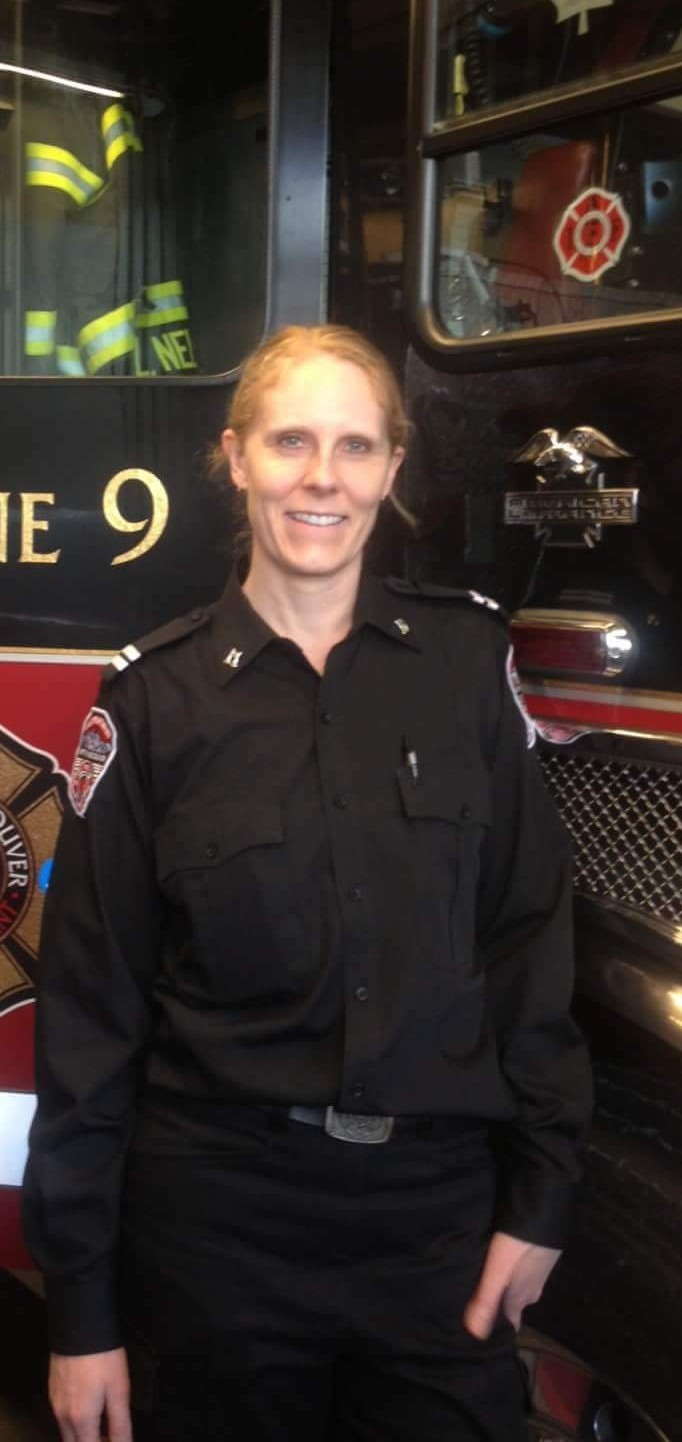Extinguishing Stress in Women Firefighters

I learned the Transcendental Meditation technique in 1973, and was trained to be a teacher of the TM program in 1984. With a BA in Recreation Therapy, Management and Administration as well as my training as a TM teacher, I’ve enjoyed fulfilling the role of the Director of the Vancouver TM for Women Centre. In that position, and as a National Board Member of the Canadian Women’s Wellness Initiative (CWWI), I’ve been able to bring the TM program to women in high stress professions, including firefighters, police, first responders, nurses and teachers.
Incorporated in February 2017, the CWWI—the women’s wing of the Transcendental Meditation organization in Canada–serves women whose jobs, health, and lives are at risk due to chronic and acutely high levels of stress in their professions.
In 2015, the Canadian Association of Fire Chiefs (CAFC) and the International Association of Fire Fighters launched a mental wellness initiative, stressing the importance of acknowledging psychological stress in the firefighting profession and of finding solutions. Several months ago, with the assistance of the Team Coordinator for Critical Incident Stress Management, Vancouver Fire and Rescue Services, I sent invitations to women firefighters in the Vancouver BC area inviting them to attend introductory presentations on TM. In addition, the CWWI offered ‘Wellness Scholarships’ to the women firefighters to learn TM. Many firefighters attended the introductory talks and were very grateful for the opportunity and eager to get started!
As soon as I taught TM to the firefighters the benefits were very clear, and they continue to grow as the participants meditate regularly, and more enroll.
Sam van Born, Captain of the North Vancouver City Fire Department, reported:
I have been a firefighter for the past 17 years, and am the first and only female fire fighter in my department. I have worked my way up the ranks and have become a full time Captain as of August 1st, 2017.
I have been practicing TM for six months now and I am feeling less stress , less anxious , and far less annoyed by the frustrations one comes across in day to day life.
Through TM I have been releasing a lot of built up tiredness. I have found TM very relaxing and I can now easily fall asleep. TM allows me to face the day without having such a short fuse, and to go about my day with much more ease, understanding, and presence.
I think anyone in the first responders field would benefit from learning and practicing Transcendental Meditation.
Challenges faced by firefighters

My initial experiences teaching the TM technique to women firefighters in the Greater Vancouver area introduced me to another world: a world of women who often put their lives on the line for the rest of us, women who are committed, brave, and highly focused—and exposed to more stressors regularly than most of us see in a lifetime.
According to the CAFC, between 10%-35% of first responders in Canada will develop Post Traumatic Stress Disorder (PTSD). Issues for firefighters include:
- high levels of alcoholism and substance abuse
- 50% higher rate of marital problems than comparison groups
- A suicide rate 30% higher than that of comparison groups
Firefighting is, obviously to all of us, physically dangerous, with routine exposure to fire, chemicals and biological hazards. But, less obviously, it is also extremely psychologically taxing due to daily threat of severe injury or death. Firefighters work long shifts and can suffer from sleep deprivation. They must operate technical equipment whose malfunction may have fatal consequences.
Firefighters suffer from secondary exposure to stress as well, as they are usually first on the scene of acts of violence and accidents. They may have to respond to catastrophes such as floods, earthquakes, school shootings or train or plane crashes. The detrimental emotional impact of these first-hand experiences of witnessing disasters and suffering to such a degree cannot be underestimated.
Women firefighters necessarily perform the same stamina-challenging tasks as male firefighters. In Canada, firefighting is a predominantly male profession, with fewer than 4% of volunteer or professional firefighters being women. Unfortunately, this minority status adds further psychological stress as women firefighters may face harassment or bullying.
How the Transcendental Meditation program helps
Transcendental Meditation is an effortless technique that allows your mind to settle inward, beyond thinking, to the most silent, peaceful level of the mind. The technique is practiced for twenty minutes twice-daily, sitting comfortably anywhere with eyes closed. Simple, natural and easy to learn , it doesn’t require clearing your mind of thoughts or concentrating. It’s so effortless, within just a few minutes anyone can transcend or go beyond agitated levels of thought. At the same time, one’s body becomes deeply rested and the brain becomes more coherent. While the mind increases in clarity, the body is dissolving stress and fatigue that could otherwise lead to disease.
More than 380 peer-reviewed research studies document the effectiveness of the Transcendental Meditation program, many of which are relevant to the health and wellbeing of women firefighters:
- Increased energy
- Increased resilience
- Faster reaction time
- Greater mind-body coordination
- Improved brain functioning
- Improved memory
- Faster recovery from stress
- Reduced psychological distress
- Reduced use of alcohol and drugs
- Reduced flashbacks and memories
- Decreased insomnia
- Reduced risk of cardiovascular disease
TM for inner strength, Resiliency and Productivity
Rebecca Hathaway, Fire Inspector in the North Vancouver City Fire Department told us:
I’m a Fire Inspector with the North Vancouver City Fire Department. I deal with the public on a daily basis completing inspections, enforcement and public education. As well as conducting fire investigations, including those where death has occurred. I’m also an active volunteer member of the Royal Canadian Marine Search and Rescue.
Previous to my joining fire service I was a police member in England for 8 years. Five of which I spent as a Crime Scene Investigator. I spent most of my eight-year career in an inner-city area with a lot of violent crime. I was often faced with many difficult, harrowing and bizarre situations. Two of which affected me greatly. The first was an incident that happened in my first few days on ‘the beat’. We came across a young male who was unconscious and then stopped breathing. I commenced CPR whilst the ambulance was on route, but he didn’t survive. After the event I was given a ‘good job’ pat on the back and sent back out on patrol, this was old school style. Suck it up; no follow up, no debrief, no mental health check. I blamed myself not saving him for a long time.
The second was the on-duty death of a colleague. Some counselling and team debriefings happened this time, but it was not something that you get over easily. These events along with others, some seemingly inconspicuous, accumulated to cause me physical and mental symptoms.
Due to my personal experiences, Critical Incident Stress (CIS) has become an interest to me. CIS and daily life can affect us in ways that we don’t realize. When I was introduced to Transcendental Meditation (TM) I was skeptical. I’m a scientist at heart and the thought that just sitting and meditating for 20 minutes twice a day was not something I thought would work. However, I was interested in anything that could help me or prevent others suffering the way I did, so thought I would give it a go. I’m glad I did, and there is a lot of science behind TM.
TM has helped me to get myself out of the cycle of self-blame and guilt. It’s like it rebooted my mind. Everything seems more ordered and logical now. The tension, worry and flashbacks have practically gone and I feel more rested and energized. Don’t ask me how it works, but it does. I also actually notice a difference in my mood and productivity if I skip a session or two of TM.
Would I recommend TM? Heck yes! Even if you don’t think you are suffering TM helps build inner strength, resiliency and productivity. You’ll notice a difference!
With these wonderful results as a foundation, I will be expanding the women’s firefighter program beginning in January 2018. As part of our initiative, I will be reaching out to invite many more women from every fire department in the Greater Vancouver area to attend introductory presentations on the TM technique. More Wellness Scholarships will be available from the CWWI for women firefighters to learn TM.
Firefighters interested in the TM program for themselves or for their stations and colleagues in other geographical areas of Canada are welcome to call the Canadian Women’s Wellness Initiative at 902-821-2361. In the United States, call 800-635-7173.
About the Author
Deboragh Varnel is on the National Management Board of the Canadian Women’s Wellness Initiative and Director of the Vancouver TM for Women Centre





